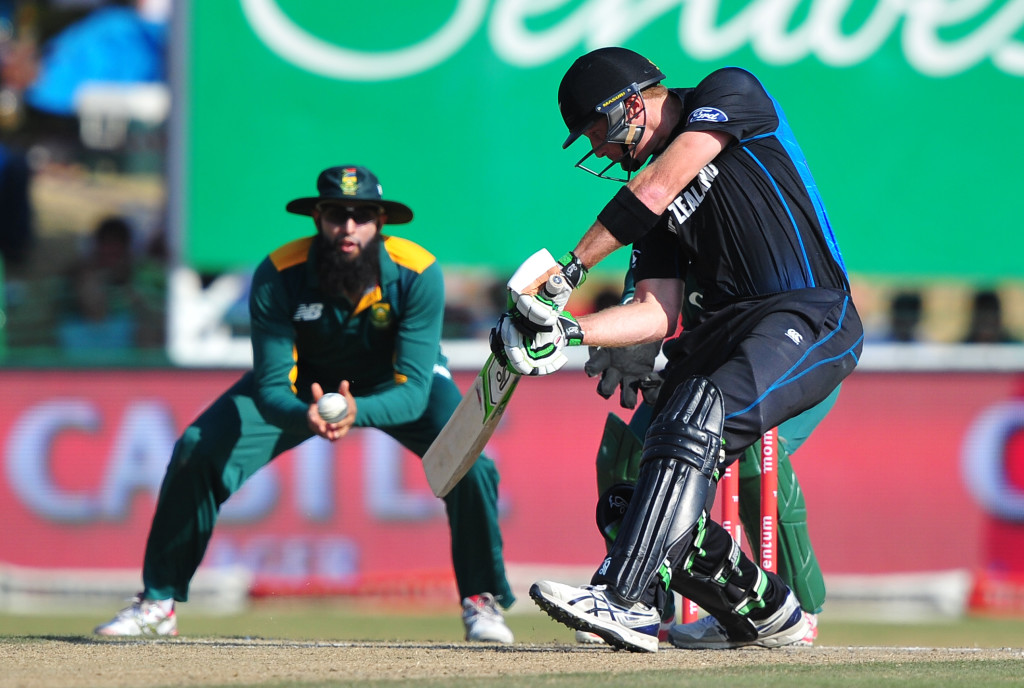New Zealand levelled the series at 1-1 with a game to play after an opening partnership of 126 secured a comfortable eight-wicket victory in the second ODI in Potchefstroom on Sunday.
Martin Guptill (103 not out) and Tom Latham (64) made batting look easy on the same surface South Africa struggled to reach 204. They finished on 207-2 in 44.3 overs.
This defeat continues South Africa’s inconsistent streak in the 50-over format and serious questions will need to be asked if the home side fail to win the series in the final ODI in Durban on Wednesday.
Aaron Phangiso, who replaced Kagiso Rabada for this game, opened the bowling with Vernon Philander but the move failed as the off-spinner conceded 18 runs in his first two overs.
After missing quite a few chances in the field during the first ODI, South Africa again didn’t do themselves any favours by dropping Guptill three times.
Phangiso dropped the opener off his own bowling in the fourth over before the next ball was hit for four, while Imran Tahir also missed a difficult return catch shortly afterwards.
New Zealand raced to 52-0 in nine overs and batted at almost six runs an over for the majority of their innings.
South Africa had a big chance to break the opening stand when Guptill lifted a drive off Tahir towards the boundary, but the ball went straight through David Wiese’s hands, who also dropped two catches in the first ODI.
Guptill went on to score an unbeaten hundred, hitting a boundary with his score on 99 and his team needing only two runs to win.
It was New Zealand’s first win at Senwes Park in Potchefstroom.
It was clear from the outset that the Proteas would need to bowl the Black Caps out in order to win the game, but it was an unconvincing display on a slow surface and the ease with which the New Zealand batsmen reached their target will be of concern for AB de Villiers and coach Russell Domingo.
South Africa’s below-par score was based on a patient, well-paced 70 from Farhaan Behardien after they had slumped to 76-4 on a pitch devoid of any pace.
The dismissals were largely soft, a combination of bad timing and poor shot selection. Behardien (70 off 87) was the standout, playing an innings of maturity and intelligence which was not only massively important for his team, but also for the batsman himself as he tries to establish himself in the ODI side.
Behardien got out at the start of the 46th over trying to go big but hitting the ball high in the air to offer a comfortable catch for Kane Williamson off the bowling of Doug Bracewell. The dismissal brought to an end a partnership of 54 runs which he shared with Philander (30 not out).
De Villiers won the toss and decided to bat first but the batsmen failed to cope with the lack of pace in the wicket. Hashim Amla chased a wide delivery and got caught at third man, while Morne van Wyk tried to cut one too close to his body and chopped it on to his stumps instead.
Rilee Rossouw (39) and De Villiers (31) turned things around for a while with a 48-run partnership, but Rossouw mistimed a drive to give the visitors a crucial wicket. Rossouw was dropped off the second ball he faced when Adam Milne failed to hold on to a return catch which, in fairness, was hit very hard back at him.
Milne also afforded Behardien a second life when he dropped another return catch with the batsman on 37.
This was a situation tailor-made for the likes of Behardien and Wiese (8 off 24) to show their mettle, but only Behardien grabbed the opportunity after Wiese tried, unnecessarily, to sweep across the line and was trapped lbw. He was, however, perhaps a bit unlucky as replays showed the majority of the ball landed outside leg-stump.
A series-winning victory in the third and final ODI now becomes vitally important for the home side.







